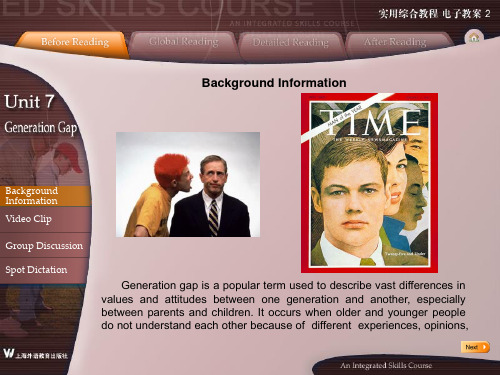世纪大学实用英语综合教程第二册第7单元PPT学习
- 格式:pptx
- 大小:230.93 KB
- 文档页数:31


教案教学内容与组织安排1st period Text A (Global Reading)2nd period Text A (Detailed Reading)3rd period Grammar Review4 th period Practical Writing5th period Text B6th period Improve Your Reading Skills1st period Text A (Global Reading)Tell your classmates what you would do in the following situations and then read Text A to find what answers the author gives.2nd period Text A (Detailed Reading)Questions for understanding of deatails1) What does the author think Mary should do?Mary should say what she thinks directly to Harry.2) Why should people be honest according to the author?Because honesty makes things simple. / Because honesty is the easiest solution.3) Instead of being honest when they make mistakes what do people do?People try to create stories and excuses.4) What will happen to you if you are honest with people?You will benefit in the end.5) What is strange about the author’s friend who came to see him recently?He wouldn’t tell the author he wanted work though he couldn’t even pay his rent.6)It is really not that complicated… Why complicate life?By asking for it.7) How do you show respect both to others and to yourself?Be honest with others.Sentence Analysis➢其实这事并不那么复杂……为什么要把生活复杂化呢?句中complicated是形容词,complicate是动词。

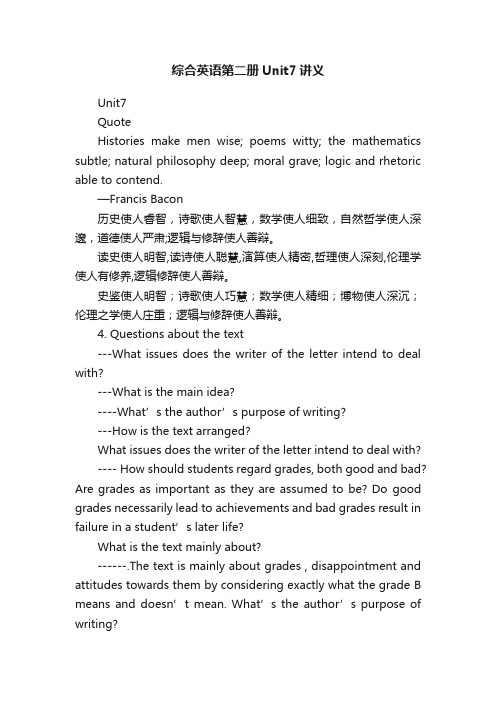
综合英语第二册Unit7讲义Unit7QuoteHistories make men wise; poems witty; the mathematics subtle; natural philosophy deep; moral grave; logic and rhetoric able to contend.—Francis Bacon历史使人睿智,诗歌使人智慧,数学使人细致,自然哲学使人深邃,道德使人严肃;逻辑与修辞使人善辩。
读史使人明智,读诗使人聪慧,演算使人精密,哲理使人深刻,伦理学使人有修养,逻辑修辞使人善辩。
史鉴使人明智;诗歌使人巧慧;数学使人精细;博物使人深沉;伦理之学使人庄重;逻辑与修辞使人善辩。
4. Questions about the text---What issues does the writer of the letter intend to deal with?---What is the main idea?----What’s the author’s purpose of writing?---How is the text arranged?What issues does the writer of the letter intend to deal with?---- How should students regard grades, both good and bad? Are grades as important as they are assumed to be? Do good grades necessarily lead to achievements and bad grades result in failure in a student’s later life?What is the text mainly about?------.The text is mainly about grades , disappointment and attitudes towards them by considering exactly what the grade B means and doesn’t mean. What’s the author’s purpose of writing?----to tell his student that he should view his grades and his disappointment correctly.What type of writing is this essay?-----argumentation.Apart from the first paragraph, the rest of the text falls clearly into three parts, each of which is marked at the beginning by a key word or words. Try to find these key words.----Paragraphs 2–5:Disappointment-----Paragraphs 6-8:The student as performer; the student as human being.-----Paragraphs 9-10:PerspectivePart 1 (paragraph 1)Understanding the paragraph:1) What does this part mainly talk about?2) What change about grades has the author mentioned briefly?3)What, according to the author, has caused the feeling of disappointment?4) Has the author stated his purpose of writing in this paragraph? If yes, what is it? If not, where is it stated in the text?Main idea of this part:It introduces the topic of the letter: grade B for the course and the feeling of disappointment.What change about grades has the author mentioned briefly?----The author has mentioned briefly the change in the way grades are regarded, i.e. the norm has shifted upward.What, according to the author, has caused the feeling of disappointment?-----It has to do with the general social climate where grades determine eligibility for graduate school and special programs. This is why the author says there is nothing he can do to remove the feeling of disappointment.Has the author stated his purpose of writing in this paragraph? If yes, what is it? If not, where is it stated in the text?----- The purpose of writing the letter is not stated in this paragraph. It is not specifically mentioned until the third paragraph.I’m certain that nothing I can say will remove that fe eling of disappointment, particularly in a climate where grades determine eligibility for graduate school and special program. (Paragraph 1)Translation:我肯定无论我说什么都不会消除你的沮丧心情,特别是在我们生活的环境中,考试分数直接决定你是否有资格读研究生和申请一些特别的学习项目。




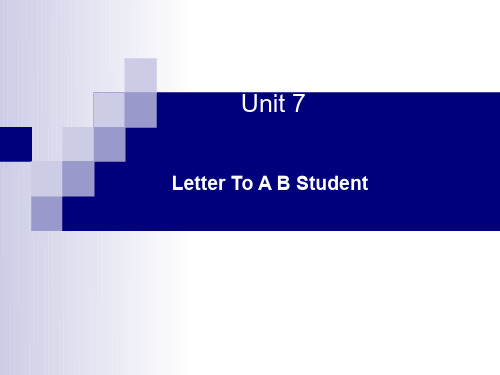
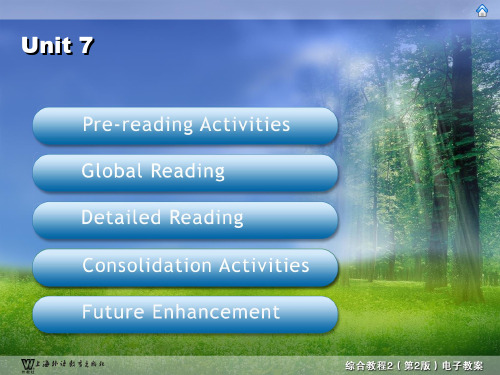
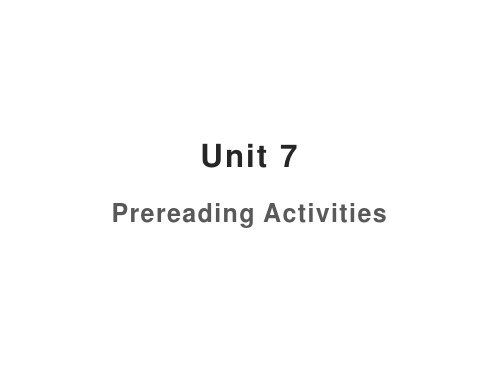

New Century College English (BookⅡ)Unit 7Text A What Does Teamwork Really Mean?I. Teaching Objectives:1. Understand the true meaning of teamwork2. Understand the usage of analogy3. Master some key words and useful expressionsII. Teaching Content1. Lead-in Activities2. Text Organization3. Language Points (difficult sentences, key words, and phrases)4. Grammar Focus(direct and indirect speech)5. Guided PracticeIII. Teaching Process1. Warm-up Questions1).In our daily life, teamwork is necessary. Talk about your experiences of participation inteamwork. What have you learned from such experiences?2).What does teamwork mean to you?3).What makes a successful team?2. Text OrganizationPart I (Paras.1-2) It is an essential requirement of any employment that any potential employee isa team player.Part II (Paras.3-11) A company is just like a football team. Every member has the duty to help achieve the team’s goal and the right to offer ideas..Part III (Para.12-15) If you are not happy in your working environment, try to find out if there is anything wrong with you or your team.3. the Usage of AnalogyIn the text, the author makes use of analogy to explain the term “teamwork”.Analogy is a special kind of comparison and a more concrete way to explain things.The purpose of the use of analogy is to explain something vast, remote, unfamiliar, abstract or specialized.In this text, the author likens the corporate team to the football team to answer the question of the title “What does teamwork really mean?”4. Language PointsDifficult Sentences1)(Para. 3) The simplest analogy to the corporate team would be a sports team.Paraphrase the sentence.(= In the simplest way, we may liken the corporate team to a sports team.)Translate the sentence into Chinese.(= 打个最简单的比方,一个企业团队就好比一个运动队。


What Does Teamwork Really MeanSharon Saw1)In many job interviews, a common question is whether the interviewee is a "teamplayer". More often than not(unless the interviewee is particularly stupid, or maybe particularly honest but doesn't want the job), he or she will say "yes". But what does being a team player really meanOn the most basic level, a team player is someone who can work within a group of people. This group is a number of people greater than one. Even if there are only two people in the group, they can be called a "team". Therefore it is anessential requirement of any employment that any potential employee is a team player. On a deeper level, a team player is someone who can play a role in the team, to achieve and support the goals set and agreed upon by the team. The simplestanalogy tothe corporate team would be a sports team. There are two main aims of the football team. One is to score goals and the other is to prevent the opposition team from scoring. In football, there are eleven players per side, and almost the same number ofplayers in reserve. There are also other vital members of the team in the background, such as the coach, the doctor, etc.Every member of the team has a very specific role - as acaptain, goalkeeper, striker, midfielder or defender. Every member of the team is vital tothe success of the team. If there is one player missing, the team is handicapped. If one player does not perform to the best of his or her ability, the team is handicapped.The captain is there to give direction to the team, in strategy, motivation and inspiration. But he or she also has to play as part of the team. Egos do not play any part in teamwork. If one's ego gets in the way, such as if one player wants to score a goal and be a hero, he or she may take rash actions instead of maybe letting another person score or helping to create the opportunity to score.Similarly in the corporate world, each company has its clearly defined goals. Usually these are not as easily specified as in a football match. And it is the job of every employee to ensure that these goals are met. Every member of the corporate team should have specific roles and responsibilities in view of achieving these goals.There can only be one captain of the company, and he or she should be responsible for giving leadership and guidance to the team members. The leader should alsocontinuously communicate the overall business strategy, as well as providing motivation and inspiration to the team. The leader has to have the loyalty of the team. If the team is not loyal or has no respect for the leader, the members of the team will not listen to the captain and the objectives of the company would not be achieved.In every action of the team, the objectives of the company, and / or, business strategy, MUST be first and foremost. The success of the team relies completely on every member of the team carrying out their roles and responsibilities in line with the direction of theleader. There has to be a "oneness" of the corporate culture. There is no room in the company for anyone who does not share the same corporate goals or objectives.Being a team player does not mean that you do not have any ideas of your own. It does not mean you should always agree with the rest of the team. It does not mean that you should merely follow the herd. There are times when your vision may differ from the vision of the company, the leader or the rest of the team. It may be a valid vision and if you believe in it strongly enough, you should share it with the rest of the team. Your idea may complement the corporate objectives and goals. Or it may not. If the leader isa competent one, he or she will assess it on itsmerits and not let ego get in theway. However, should the team not agree with your vision, don't take it personally.They may find the idea inappropriate, not YOU personally. Don't take it as a sign of personal rejection. A good leader should be able to communicate this to a team member, but if he or she doesn't, and it turns out as appearing to be a rebuff, don't lose heart. If the team found YOU inappropriate, you would be the first to know. If your leader or team members see that you can handle rejection of your ideas in a mature manner, it is only to your own credit.Don't be afraid to offer new ideas even seemingly crazy ones. Everyone in the team should feel free to offer ideas and not worry about them being dismissed. Usually when ideas are not taken up, people may take it as a personal rejection. Don't. Just accept it, and move on. There is work to be done.The pleasure of working in an environment where every member of the team is a team player is unparalleled. If you are not enjoying your working environment, chances are high thatyour team is also not working well. Ask yourself this:Are you a team playerAre your own objectives in line with those of the teamAre your team objectives in line with those of the company If not, why not。
